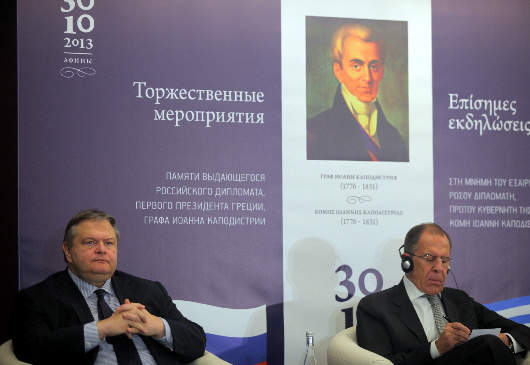 Your Excellency the Foreign Minister of the Russian Federation, we are very pleased at your presence here in Greece and Athens today: the presence of the Russian Foreign Minister at the opening of a conference on Ioannis Kapodistrias, which points up the depth of the historical ties linking Greece and Russia.
Your Excellency the Foreign Minister of the Russian Federation, we are very pleased at your presence here in Greece and Athens today: the presence of the Russian Foreign Minister at the opening of a conference on Ioannis Kapodistrias, which points up the depth of the historical ties linking Greece and Russia.
Ladies and gentlemen Ministers, ladies and gentlemen Ambassadors, ladies and gentlemen, this event, the organizers of which I congratulate, coincides with the 185th anniversary of Ioannis Kapodistrias’ election as the governor of the new Independent Greek State.
But it also coincides with the 185th anniversary of the establishment of Greek-Russian diplomatic relations, which are political relations, but more than political, they are profound cultural, intellectual and religious relations.
It is no coincidence that this year we are also celebrating the 1025th anniversary of the Christianization of the Russians, and I must make special mention of the fact that, beyond the Greek participation in the organizing committee, thanks to the efforts of Vladimir Yakunin, the organizers of today’s event also include the National Glory of Russia Centre and the Foundation of St. Andrew the First-Called, two very important Russian foundations that are collaborating with the Center for European Studies and Humanities “Ioannis Capodistrias”.
For us here in Greece, Ioannis Kapodistrias symbolizes an unrelenting effort – often unsuccessful: the effort for Greece to gain an organized modern European state. This has been a permanent target from the post-revolution era until now, the era of the deep economic crisis. But at the same time it was also a source of contention within Greek society: whether Greece should or can become a modern Greek state in the service of growth, the people, public interest.
It is no coincidence that the fundamental priorities of Ioannis Kapodistrias were the formation of mechanisms and institutions of justice, education, welfare. Ioannis Kapodistrias is associated with the first efforts for Greece to gain a rudimentary monetary and financial system; with the efforts to create a regular army and military education.
Ioannis Kapodistrias, as others will go into more fully than I, was in his time a genuine renaissance man, a genuine Septinsular, as well as a Greek with a profoundly deep patriotic conscience, at a time when the state needed to be formed and national conscience needed to be consolidated.
He belongs to the same cultural tradition as our national poet Dionysios Solomos and our equally national poet Andrew Kalvos, and it is no coincidence that he had a medical philosophy educational predilection, like Adamantios Korais.
Ioannis Kapodistrias is a obviously a figure of great importance to the Foreign Ministries of Greece and the Russian Federation, because, as we all know, he was a very great diplomat, a cosmopolitan of his time, but at the same time profoundly patriotic, focused on national interests.
He served in Tsarist Russia’s Diplomatic Service, he reached the highest offices, in parallel with his perhaps personal adversary, Nesselrode, he served two Tsars, was identified not only with the history of Greece, but with that of other countries. And it is no coincidence that he is honoured in the Swiss Confederation almost as much as he is honoured in Greece and in Russia; while still alive he was an honorary citizen of the Canton of Vaud and of the City of Geneva.
And I would like to thank in retrospect His Excellency the Foreign Minister of the Russian Federation, Sergey Lavrov, for finding the time to personally attend, a few years ago, the unveiling of the bust of Ioannis Kapodistrias in Lausanne.
Slovenia also lays claim to a portion of Ioannis Kapodistrias’ intellectual and political legacy, and, of course, in Greece he is identified with all our old capitals, with Nafplio and Aigina.
Just as he is associated with one of the most critical chapters in global diplomatic history, with the Vienna Conference, with the era of the Holy Alliance. He has been compared in international letters with “giants” of the global international stage like Maeterlinck and Talleyrand.
His diplomatic struggle for Greece, before and during the revolution, before and after he took up his duties as the first Governor, are a very important element in Greek history, the history of the formation of the new Greek State.
And it is unquestionably a dark page in Greek history that this great man, this great patriot, fell victim to petty, opportunistic conspiracies, victim to a political assassination, because great initiatives always engender great opposition and major disputes.
I am pleased because, in Mr. Lavrov’s presence, we are today honouring the emblematic figure Ioannis Kapodistrias, which to us is an unpaid debt, a duty to make our country truly modern, truly competitive; a European democracy of rule of law that serves the development, the prosperity, the progress of the Greek people – especially today, following the dramatic experience of the crisis of the past four years, when we must present an optimistic narrative to Greek society and once again put forward the optimistic and credible image of our country in the international community.
Thank you.
October 30, 2013


